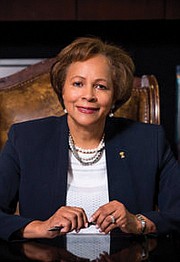Closure pending as Bennett College loses accreditation
Free Press wire reports | 12/21/2018, 6 a.m.
GREENSBORO, N.C.
After two years of probation, Bennett College, one of just two historically black private women’s colleges in the country, has lost its accreditation, threatening the 145-year-old school’s survival.
But Bennett College President Phyllis Worthy Dawkins said last week that the college has appealed the decision by the Southern Association of Colleges and Schools Commission on Colleges, according to the Greensboro News & Record.
In 2016, the college was placed on probation for failing to comply with the commission’s standards for financial resources, financial stability and its governing board. Without providing details, SACS extended the probation last December, giving Bennett College one last year to improve its financial picture. It did not list continued concerns with Bennett’s governing board.
While SACS didn’t publicly highlight where Bennett was found deficient, the school has struggled financially amid a decline in enrollment. Bennett has blamed the enrollment on the Great Recession and a 2011 change that tightened credit regulations for a federal loan program used to pay for college. The college held two rounds of layoffs, in 2013 and 2015, to try to bolster its financial health.
Bennett College has touted its own improvements since it was first placed on probation.
“I think we’ve done well,” Dr. Dawkins said. “Apparently we need to do a little bit more.”
Last year, Bennett College saw its first increase in first-year enrollment in seven years with the class that entered in the fall of 2017. Dr. Dawkins said then that the school would focus on raising money and increasing enrollment.
Bennett has since beat a $4 million fundraising goal, and had its financial audit come back clean.
The college is soliciting funds from alumnae and other donors, stressing strides in enrollment, retention rate and average GPA in online posts. This approach has worked in the past, when the commission lifted a two-year sanction in 2003 after then-president Dr. Johnnetta Cole raised $15 million in 18 months.
Bennett, which enrolls around 470 students, will remain open and accredited until Dr. Dawkins appears at a hearing Feb. 18. A denial of appeal would endanger the survival of the school where almost all students receive financial aid to attend. Without accreditation, colleges and universities cannot receive federal funds to cover tuition and other student expenses.
Most historically black women’s colleges have closed, merged with other schools or turned coeducational. The Greensboro college’s closure would leave Atlanta’s Spelman College the last such school in the country.
Meanwhile, SACS officials announced that St. Augustine’s University, an HBCU in Raleigh, N.C., has emerged from probation.
SACS had put St. Augustine’s on probation for the past two years, citing financial problems and questions of institutional effectiveness. Loss of accreditation could have forced the university to close.
On Dec. 11, the association’s board of trustees announced it had removed St. Augustine’s from probationary status.
University President Everett Ward said that the accreditation agency was impressed by how the university invested $1.7 million in a project that helped shift the university from doing its accounting manually to using software.
Officials said enrollment now stands at 767 students, down from between 970 and 980 students during the last school year.








